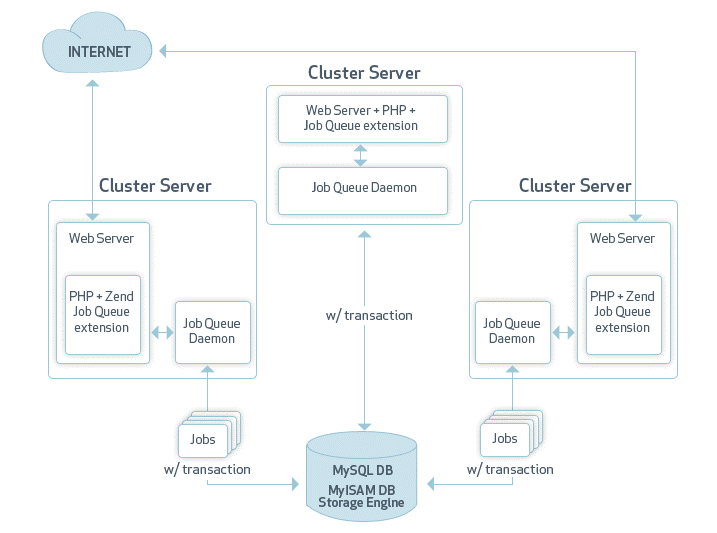Scalability
The PHP/Java Bridge module provides PHP centric companies with a well-rounded environment making sure that the organization benefits from the ”best of both worlds”. Be it existing investments in J2EE application servers that require this solution, or to provide a means for organizations, if they choose, to bridge language limitations by use of Java applications. The Java Bridge is not limited to interactions strictly with J2EE and legacy systems, the Platform PHP/Java Bridge also provides the ability to interact with plain Java objects.
Job Queues provide offline asynchronous processing of tasks and activities that can be run independently of the end user experience.
The Jobs![]() Jobs contain information about a specific Job (script to run) that you have set to run in your environment. approach is used for streamlining
offline processing of PHP scripts. It provides the ability to delay execution
of “heavy” parts of web applications that originate from direct user interaction
with a Web Server. As result it may significantly improve response time
and reduce Web Server load.
Jobs contain information about a specific Job (script to run) that you have set to run in your environment. approach is used for streamlining
offline processing of PHP scripts. It provides the ability to delay execution
of “heavy” parts of web applications that originate from direct user interaction
with a Web Server. As result it may significantly improve response time
and reduce Web Server load.
Any PHP script can create a job which will be executed later, separately from a current HTTP request. The job itself is just an additional HTTP request to another PHP script that can be done on the same or different Web Server.
A Zend Server cluster Job Queue is comprised of four main components:
-
Web Servers- The servers in which the PHP and Job Queue Extensions reside. In some cases, these servers execute jobs as well. In other case, jobs are executed on Backend Web servers.
-
Job Queue Extensions- A PHP extension that passes the jobs to the Job Queue Daemons.
-
Job Queue Daemons- The component that is in charge of managing scheduling, queuing and executing tasks.
-
MySQL Data Base- The component that stores the jobs created throughout the cluster.

For additional information on a cluster Job Queue architecture, see Zend Job Queue.
Deployment allows you to package an application and deploy it using Zend Server, making it available for users on the Web. Deployment can be carried out via the User Interface, or via the Web API. Zend Server will handle the web server configurations and other necessary actions to deploy the application. Once this is done, your application is live and available on the Web at the URL you have specified as your base URL. Additionally, with the deployment feature, you can sort your events according to the application name or the URL on which they occurred.
Deployment allows you to define the parameters necessary for your application (the metadata) in XML format as part of the application package. The application package includes the application data (source code), and any additional hook scripts you would like to use.
In a clustered environment, the deployment component deploys the application on all servers in the cluster.




